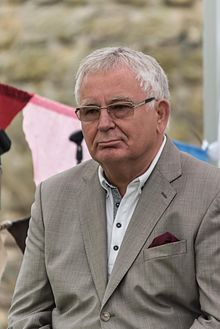- ↑ "Intervjuu: Tiit Vähi võib tööjuttu ajada ka kell kaks öösel". 28 January 2017.
- ↑ Raun, Toivo U. Estonia and the Estonians. Stanford, Calif: Hoover Institution Press, Stanford University, 2001. ISBN 978-0-8179-2852-0
- ↑ Tapes Scandal Topples Rulers in Estonia. The Washington Post. 12 October 1995 link
- ↑ Estonia Names New Prime Minister The Washington Post. 28 February 1997 link
- ↑ Vähi: Venemaa vastane sõjatõrvik kahjustab äri
Tiit Vähi | |
|---|---|
 Vähi in 2016 | |
| 11th Prime Minister of Estonia | |
| In office 17 April 1995 –17 March 1997 |
